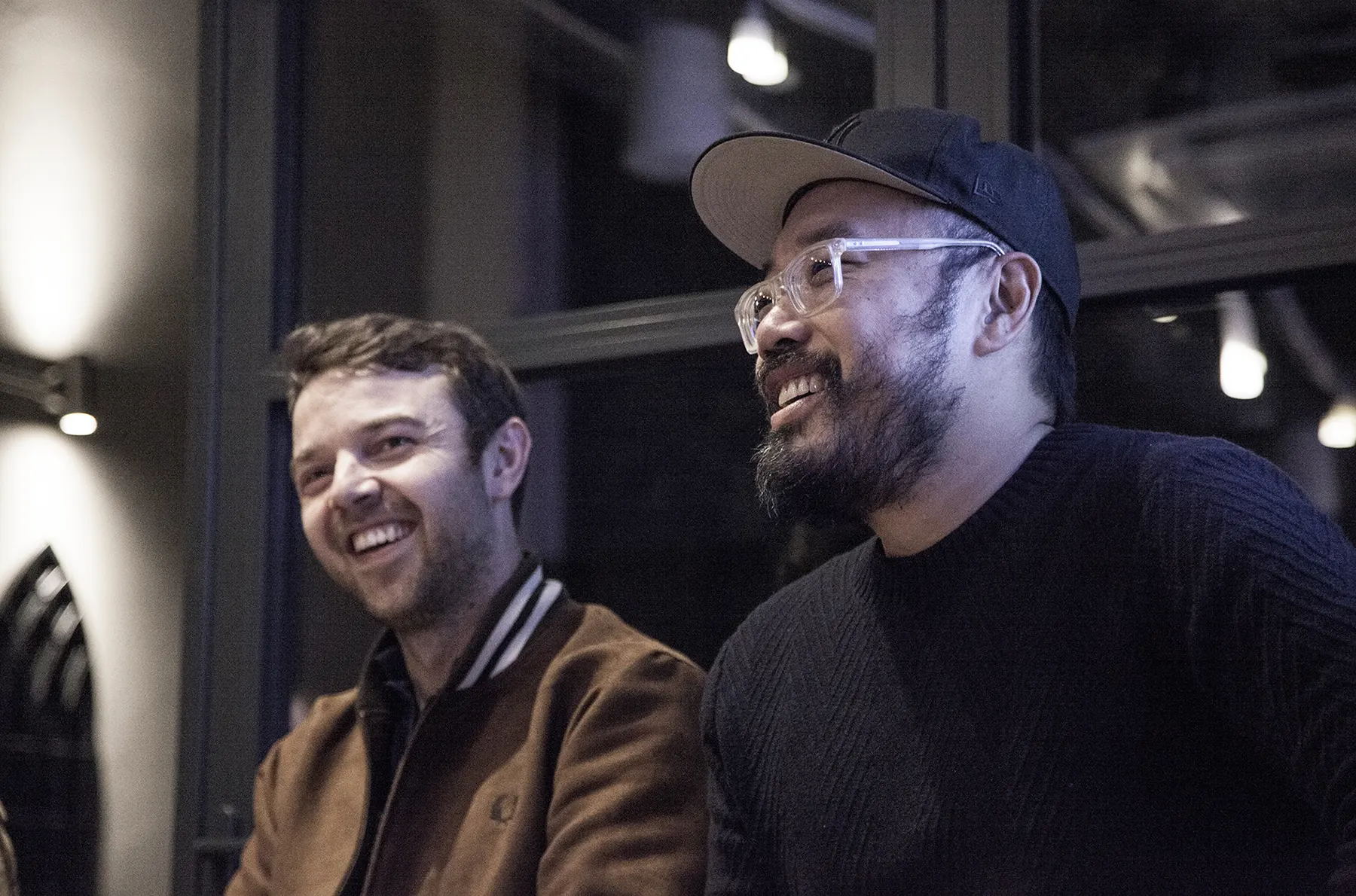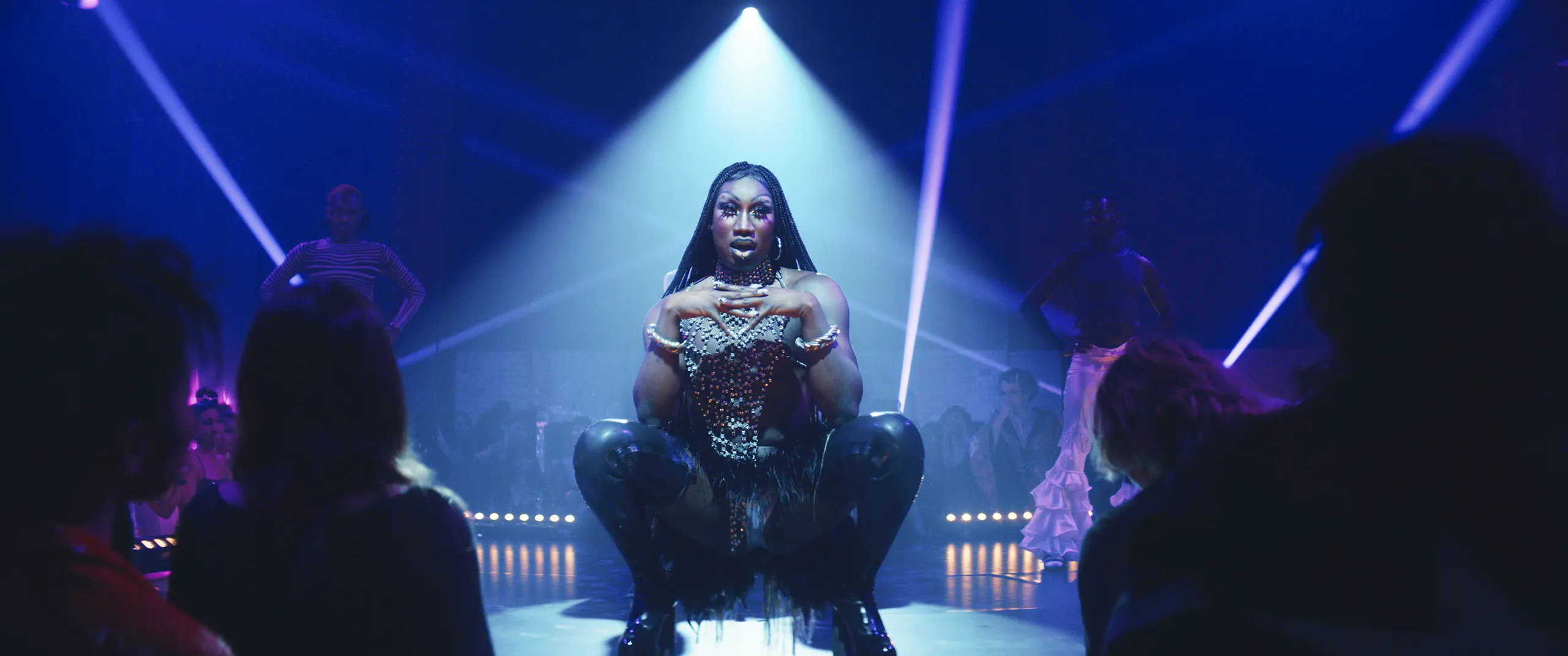
by chris carpenter
The term femme refers to an LGBTQ+ person whose gender expression is considered to be feminine. It was originally used to distinguish feminine lesbian and bisexual women from butch women, and it is still one of the main uses of the term. Today, femme also refers to someone who queers or subverts femininity.
It is also the title of a potent new movie scheduled to open in San Diego and other cities on Friday, April 5. Femme marks the feature debut of Sam H. Freeman and Ng Choon Ping, who co-wrote and co-directed it after first telling a condensed version of the story as an award-winning short film.
Lead character Jules (played by Nathan Stewart-Jarrett, previously seen in 2017’s Angels in America and 2021’s Candyman) holds a place among London’s celebrated drag artists in his guise as Aphrodite. One night after performing a show, he steps out to get some cigarettes and is brutally attacked by the homophobic Preston (George MacKay, who is well-known from such popular films as Pride and 1917).
Although Jules recovers physically, he remains traumatized and withdraws from the outside world. When he finally ventures out months later, Jules recognizes his attacker by chance in a gay sauna. Without drag or makeup and wrapped only in a towel, Jules approaches Preston incognito. He ultimately undertakes a risky affair with the deeply closeted Preston, but with a plan to exact his revenge.
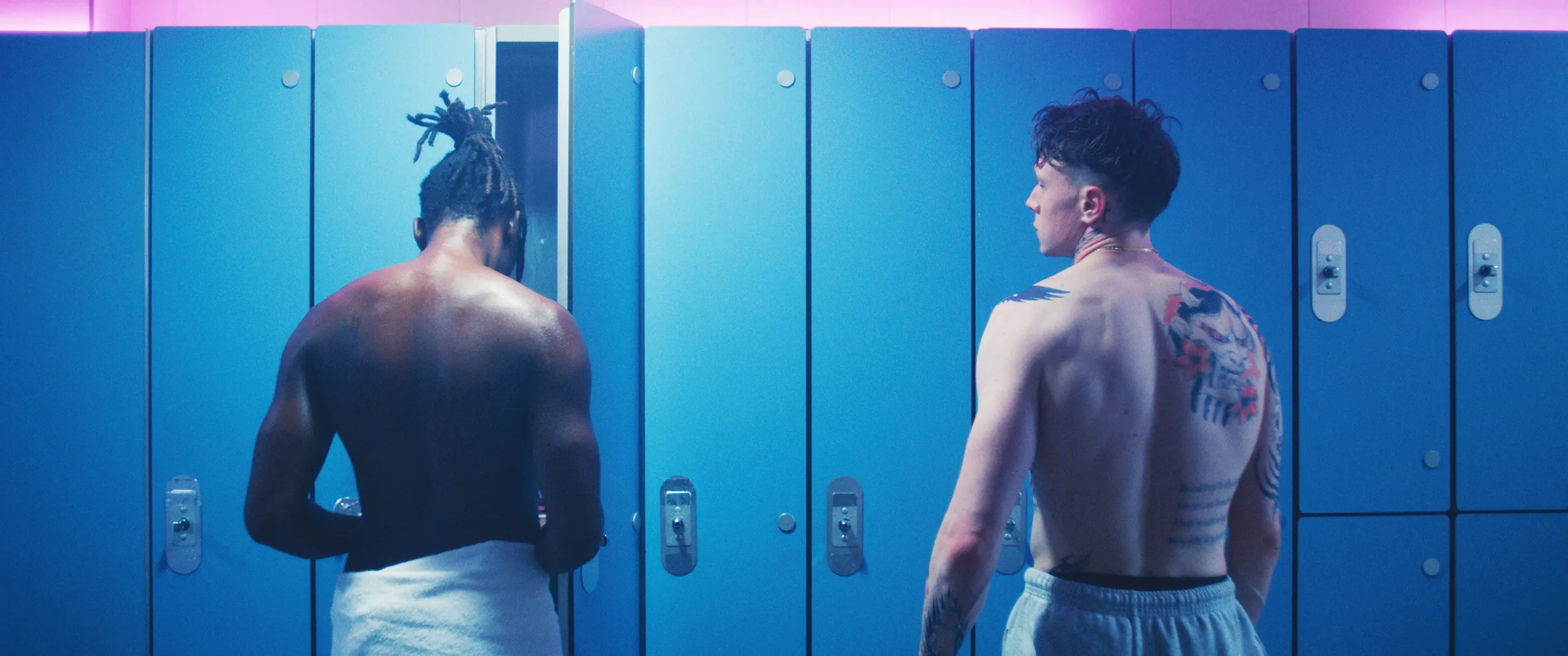
Sam and Ping, the movie’s creators, are out gay men with extensive backgrounds in television and theatre. They wrote the following about their process developing Femme:
“As we dug deeper, we came to the conclusion that the film we wanted to make was, at its core, about drag. And not only the more recognisable feminine drag that Jules dons at the beginning of the story. Almost every character in the film wears a form of drag: a performance of gender that earns them power and status in the world they inhabit. Femme delves into what happens when those masks are challenged. In a way, the film itself is wearing a form of drag. It’s a dark story, and we decided early on that we weren’t interested in making a moralistic film, where the good guys take the high road and the bad guys always get their comeuppance. Our interest lies in exploring the reality of the characters and how the world they live in propels them into doing the things that they do.”
Sam and Ping spoke with The RAGE Monthly about Femme via Zoom from their homes in London. The conversation has been edited for length and to avoid potential spoilers.
Congratulations on making a very strong, very powerful film. What have been some of the audience reactions or responses to it so far?
Ping: One of my favorite ones on Letterbox was how they hated themselves for rooting for the two characters to get together, and how sexy they felt the film was. It was entirely our intention to create really strong and edgy and, at times, confusing feelings.
Yeah, confusing or conflicted. That’s kind of how I felt while watching it.
Sam: I think conflicted was, for us, that was a sign that when people feel quite strong emotions about it or have that kind of confusion like “I felt this; does that mean I need therapy?” it meant for us a sign of, hopefully, the complexity of the humanity that is in the film. Particularly the work that Nathan and George did on those characters to try and make two quite big, quite extreme people feel very rounded, not simplistic or moralistic or black and white.
Speaking of Nathan and George, talk to me a little bit about the casting process. How did you go about it and how did you ultimately settle on the two of them.
Ping: It took a long time to eventually find Nathan. We met so many people and Nathan came late in the process because he was filming a Disney+ series, Culprits. We had a wonderful casting director, Julie Harkin, who would bring us really great options but, before we saw Nathan, we were starting to feel a bit nervous about whether we had written a character that was impossible to play. It was a character that has to go the whole gamut of emotions and had to maintain several layers of identity, quite often simultaneously, and to move and shift in subtle but perceptible ways. When we eventually met Nathan, we thought, “Oh, thank God!” This was someone who could do all the things that we wanted the character to do.
Sam: George we came to as an idea and he felt really exciting for it. When you watch his work, and we watched everything, the sort of through line is that he never does something twice. He’s always different and he always throws himself fully at the characters, and they’re all very different from each other. I think what felt exciting about George for Preston, the possibility of it, was that it felt very unexpected, because I think the general picture of George is quite a nice boy, and yet you felt confident that he would be great. And also, the film is so much about drag, thematically, that it was almost like this idea that if George MacKay had a drag king character that he was performing, maybe it would look something like Preston. There’s something in the core of George, a warmth, that kind of comes through in certain parts of the film, particularly later on, and so taking that core and building out this big character from it just felt like a really cool direction to go in.
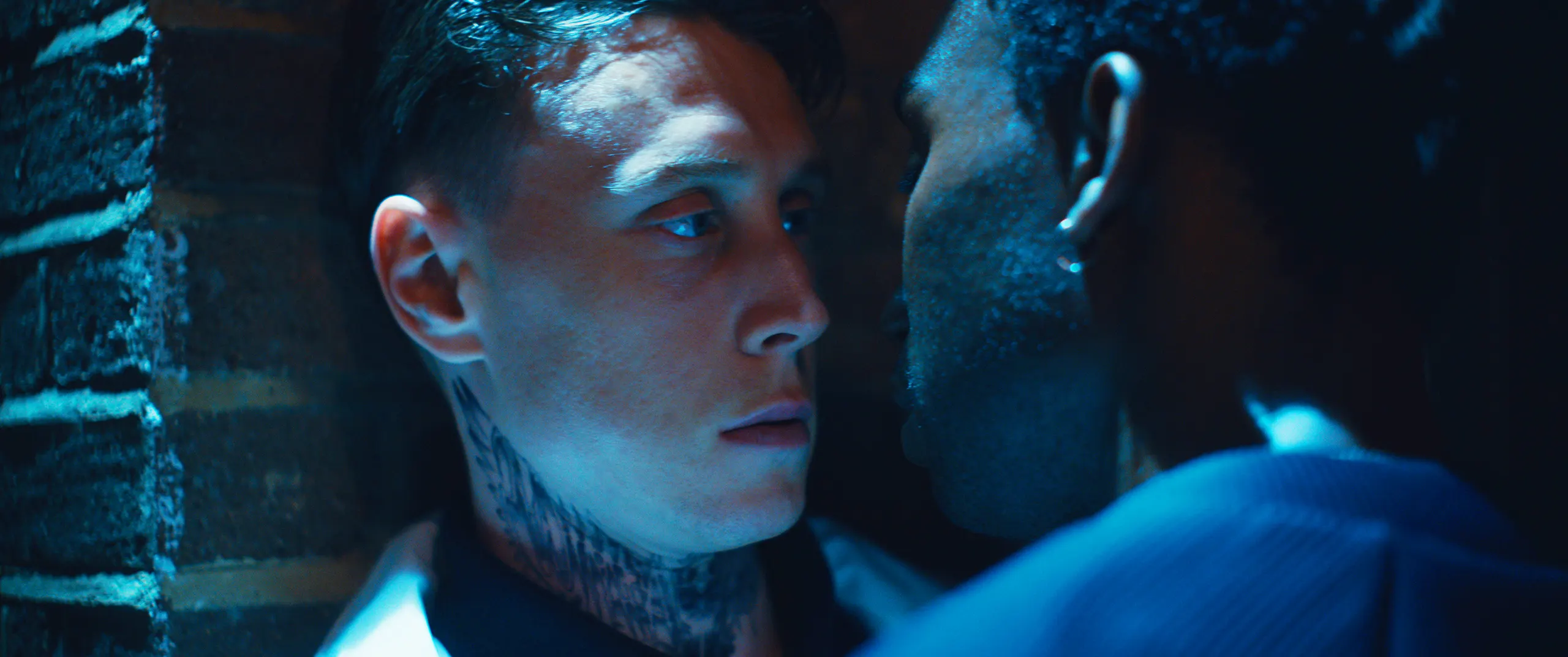
Was the story inspired by an actual situation or actual events? Where did the initial inspiration come from?
Ping: There was no specific event but events like this are all too common, you know. One is too many. We just built it out from living in the world that we live in. One of the things that I hope comes through in the film is that we might find ourselves living in a metropolitan, cosmopolitan place like London and we think that we’re safe and the world has moved on. We’re in our little bubbles and then, once you step out of that little bubble, suddenly you’re in a different world. That is the danger that not just sexual minorities, but any minority will encounter if they step out of their safe zone.
Sam: Yeah, and I suppose as storytellers we are always trying to explore or kind of exorcise things that frighten us, that preoccupy us, that make us anxious. We live in a world where, if I’m walking down the street, I have to look around and think where I am before I hold hands with my boyfriend. We think about how we dress, how we present, like it’s something we sort of have to keep in the back of our mind in a way that other people may not have to. This film was a way of taking those fears and exploring them and heightening them and exploring it through a sort of genre lens. With the Preston character, part of what we wanted to do was challenge ourselves to put ourselves in the mind of the person we are frightened of and see what happens when we also go there, and where we can take that and what that might open up for us.
You both did a great job with developing that and expanding it out, as you said. Very impressive. It ends up being a really hard-hitting film. Did either of you talk about going in a more redemptive or compassionate direction at any point?
Sam: No, but there’s actually been quite a lot of people asking about a sequel. We often discussed if they (Jules and Preston) met 10 years later, who would they be then? What would that look like? I suppose we always saw (the story) as a tragedy in a way, we always discussed it that way. It’s kind of the tragedy of revenge and that sort of toxic patriarchy, that kind of power struggle where someone has to come out on top and someone has to lose. There is no balance in that, and we felt that’s where the story had to lead us and we had to see that to its conclusion. Where does revenge ultimately take you? So often in revenge thrillers, revenge is sort of seen as kind of a positive thing; we follow the protagonist to get revenge and they win out and there’s a happy ending. We wanted to look at that in a different way, I suppose.
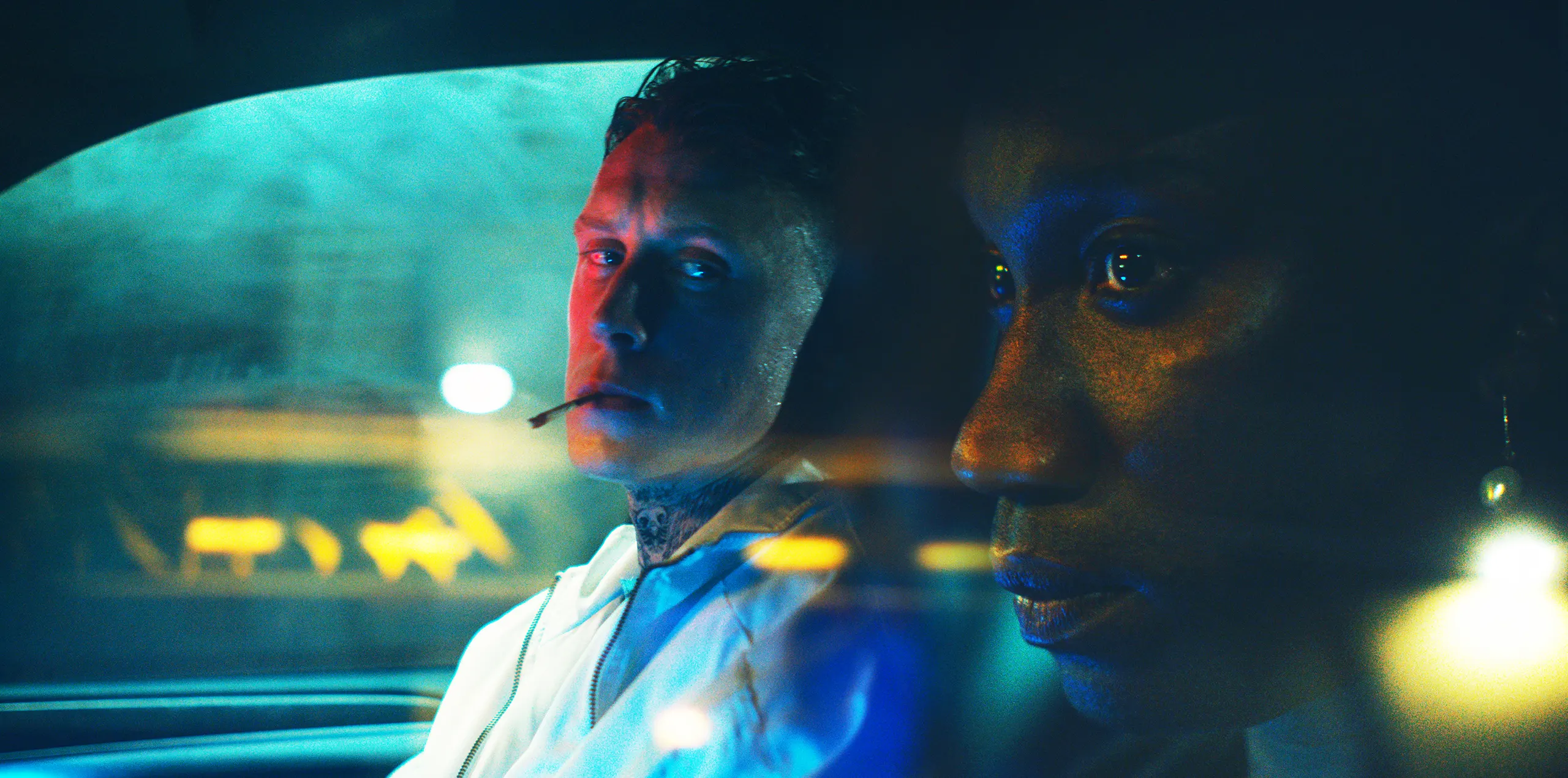
Ping: We’re kind of thrilled actually that so many people watch this film and want a happy ending. Then I think we have done our job in creating those strong emotions and attachment to the two characters, the humanity of the two characters.
Definitely. Thank you, that was helpful.
Sam: There’s something about people relating to the humanity or being touched by the humanity of even characters in such a dark situation. That is the nice thing about audiences, I guess.
Chris Carpenter has been writing about entertainment since 1996 and a member of Team Rage since 2012. He is a founding member and vice president emeritus of GALECA: The Society of LGBTQ Entertainment Critics.
